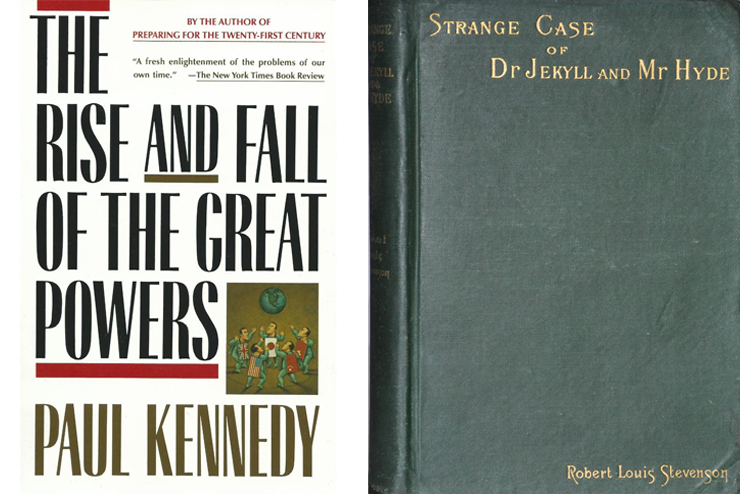Robert Louis Stevenson’s novella of split personality, the Strange Case of Dr. Jekyll and Mr. Hyde (1886) immediately caught the attention of the late Victorian reading public and has been catching attention from new audiences ever since. It has provided the inspiration for 123 film adaptations, including the madcap 1953 version featuring Abbott and Costello.
The book was published in a late Victorian culture that was itself more than a little schizophrenic. A story that dramatized the dual nature of human beings perfectly suited a society committed to hiding the less admirable features of human nature behind a curtain of respectability. Today, its title stands for the conflict between the official self we present to the world and the genuine self we harbor within.
The story came to Stevenson in a dream induced in part by the medicinal cocaine he had taken while ill with tuberculosis. Upon waking, he quickly wrote it down. However, his wife burned the manuscript, which she thought subversive. Fortunately, Stevenson was able to write it again without undue difficulty.
The tale’s most provocative feature is that it’s Jekyll, not Hyde, who is the monster. Jekyll is a torn man well before he invents his personality-altering potion. Although he’s obsessed with maintaining his distinguished image in public, he nevertheless pursues “undignified pleasures” at night and “stood already committed to a profound duplicity of life” that enabled him to act secretly on his Hyde impulses. The potion allows him to continue without compromising his exalted public image.
It’s telling that Stevenson never says what these pleasures are. He seems to have wanted us to fill in the blanks with our own wayward desires. Hyde, then, is a literary blank slate on which we are invited to write our own hidden irregularities.
I might add that Jekyll in Danish means icicle, and certainly, there is something cold about the doctor. In the “statement” he writes at the end of the narrative, Jekyll refers to Hyde as though he were another person. He thereby cooly continues to evade responsibility, even to the end of his hideous adventure.
In effect, Jekyll victimizes his Hyde self by relinquishing his moral duty to temper and thus civilize his will. By artificially distilling and dividing himself into his rational and impulsive selves, Jekyll refuses to face the moral obligation of ameliorating the will’s extravagances in the cause of civilizing it. Stevenson’s book is important because it examines this persistent theme of the modern period: the struggle to come to terms with the multiple self.
—George McCartney
I initially read The Rise and Fall of the Great Powers (1987) by Paul Kennedy, a British historian based at Yale, in some haste a few months after it was first published. I revisited it last fall in preparation for my lectures in diplomacy and was impressed. The book has aged like a fine claret, in contrast to a mountain of volumes on “international relations theory” published since that time. Its basic premises and conclusions remain sound after more than three decades, even though some of Kennedy’s predictions for the fin-de-siècle world scene went amiss.
Since all great powers’ “power” exists only vis-à-vis other actors in the international system, Kennedy argues, their relative strengths always change. Their ascendancy is dependent primarily on resources and economic strength. Sooner or later most succumb to “imperial overstretch”— a term he coined.
In Kennedy’s chronological survey, an interesting theme is the sometimes narrow margin between success and failure. The Habsburg bid for mastery collapsed under defeat by a coalition of powers, while the most successful power in the epoch of European imperialism was Great Britain, because she possessed the financial strength to repeatedly prevail over France, from Louis XIV to Napoleon. Kennedy saw the power of money, subsequently reinforced by industrial primacy, as more important to Britain’s success than the geopolitical advantage of her insular position.
Kennedy accurately predicted the decline of the Soviet Union, but not its speedy collapse; no author of note did. He was off base in predicting Japan’s continued rise and the single-actor potential of the European Economic Community (as it was then). He was right, however, on the rise of China and the relative decline of the U.S.
It is remarkable that 32 years ago Kennedy warned of the downward spiral of slower growth in the U.S. economy, heavier taxes, deepening domestic divisions, and weakening capacity to bear its self-imposed military burdens. The task facing U.S. leaders in the ensuing decades, he said, was to grasp the need to “manage” foreign affairs so that the relative erosion of the U.S. position “takes place slowly and smoothly, and is not accelerated by policies which bring merely short-term advantage but longer-term disadvantage.”
Intoxicated by the rapid and unexpected collapse of the Soviet Union, Washington succumbed to the lure of “benevolent global hegemony” instead. The enduring lesson of Kennedy’s book is that a successful great power will not seek hegemony, but the role of eminently solvent offshore balancer in a multilateral balance-of-power system—comparable to Britain’s grand strategy before 1914. This is the exact opposite of the neoconservative-neoliberal duopoly’s agenda, which has had disastrous consequences for both America and global stability.
—Srdja Trifkovic

Leave a Reply